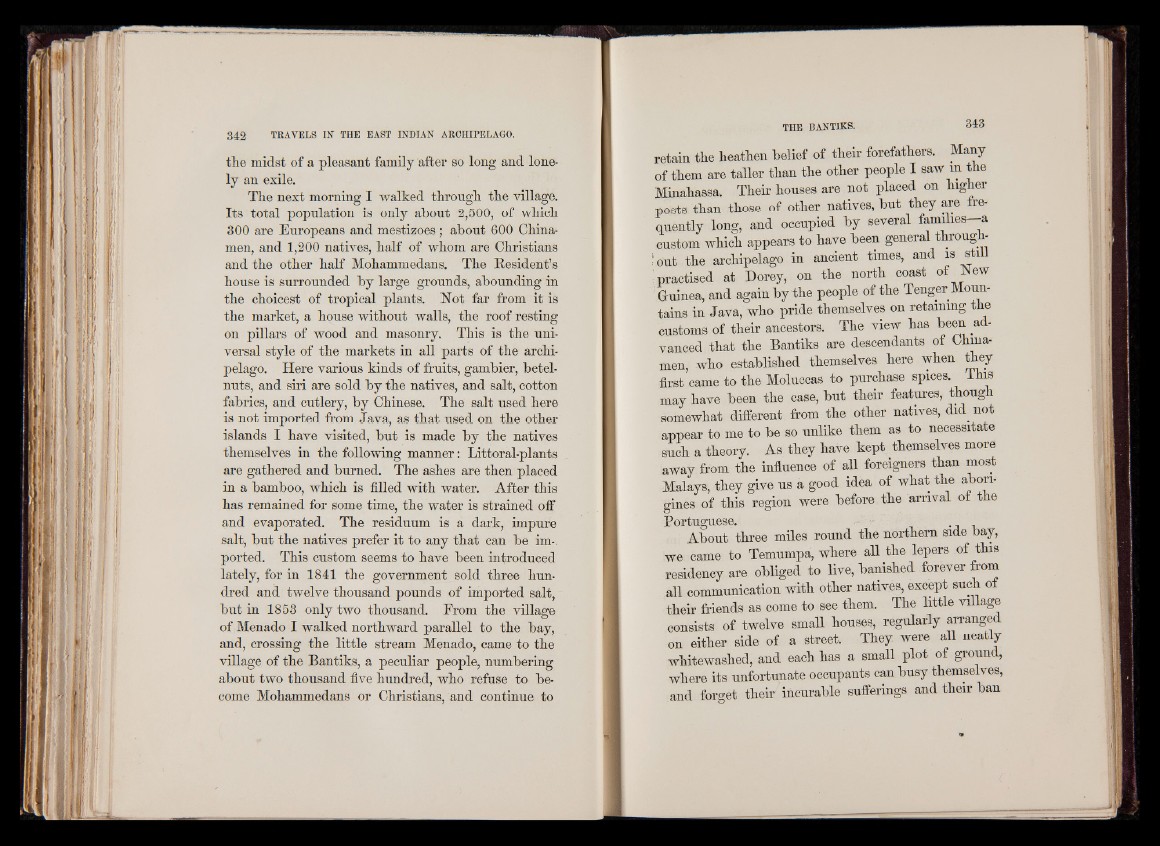
the midst of a pleasant family after so long and lonely
an exile.
The next morning I walked through the village.
Its total population is only about 2,500, of which
300 are Europeans and mestizoes; about 600 Chinamen,
and 1,200 natives, half of whom are Christians
and the other half Mohammedans. The Resident’s
house is surrounded by large grounds, abounding in
the choicest of tropical plants. Not far from it is
the market, a house without walls, the roof resting
on pillars of wood and masonry. This is the universal
style of the markets in all parts of the archipelago.
Here various kinds of fruits, gambier, betel-
nuts, and siri are sold by the natives, and salt, cotton
fabrics, and cutlery, by Chinese. The salt used here
is not imported from Java, as that used on the other
islands I have visited, but is made by the natives
themselves in the following manner: Littoral-plants
are gathered and burned. The ashes are then placed
in a bamboo, which is filled with water. After this
has remained for some time, the water is strained off
and evaporated. The residuum is a dark, impure
salt, but the natives prefer it to any that can be im-.
ported. This custom seems to have been introduced
lately, for in 1841 the government sold three hundred
and twelve thousand pounds of imported salt,
but in 1853 only two thousand. From the village
of Menado I walked northward parallel to the bay,
and, crossing the little stream Menado, came to the
village of the Bantiks, a peculiar people, numbering
about two thousand five hundred, who refuse to become
Mohammedans or Christians, and continue to
retain the heathen belief of their forefathers. Many
of them are taller than the other people I saw m the
Minahassa. Their houses are not placed on higher
posts than those of other natives, but they are frequently
long, and occupied by several families a
custom which appears to have been general througho
u t the archipelago in ancient times, and is still
'practised at Dorey, on the north coast of New
Guinea, and again by the people of the Tenger Mountains
in Java, who pride themselves on retaining the
customs of their ancestors. The view has been advanced
that the Bantiks are descendants of China-
men, who established themselves here when they
first came to the Moluccas to purchase spices. This
may have been the case, but their features, though
somewhat different from the other natives, did not
appear to me to be so unlike them as to necessitate
such a theory. As they have kept themselves more
away from the influence of all foreigners than most
Malays, they give us a good idea of what the aborigines
of this region were before the arrival of the
Portuguese. - • ^
About three miles round the northern side bay,
we came to Temumpa, where all the lepers of this
residency are obliged to live, banished forever from
all communication with other natives, except such of
their friends as come to see them. The little village
consists of twelve small houses, regularly arranged
on either side of a street. They were all neatly
whitewashed, and each has a small plot of ground,
where its unfortunate occupants can busy themselves,
and forget their incurable sufferings and their ban